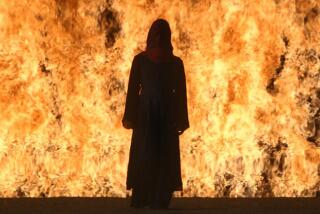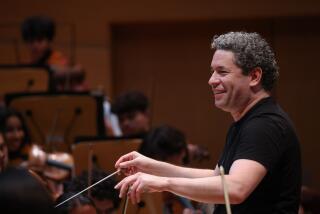Donât Waste Time Trying to Categorize Him : Composer: âIâm kind of a maverick,â says multi-reedman Vinny Golia, who blends jazz, classical and new music into a sound that transcends classification. He performs tonight in Newport Beach.
A man stands in a forest of horns. Flutes, saxophones and clarinets of all sizes as well as some unfamiliar instruments are clustered center stage as an orchestra weaves quiet, stately lines before moving into an involved but rhythmic riff. The man in the middle, Vinny Golia, picks out the baritone saxophone from the lot, straps it on and starts to blow.
That was the scene at Patriotic Hall in Los Angeles in December, when Golia led his 18-piece ensemble in a program of his original music. The list of instruments Golia played took up three lines in the program, but equally impressive were the leaderâs ambitious, sometimes-quirky compositions that seemed to transcend category with a blend of jazz, classical and new music.
âIâm kind of a maverick,â the 44-year-old multi-reedman said recently in his Culver City apartment. âIâm not closely aligned with the jazz tradition, yet Iâm very aligned with improvisational music, though Iâm not aligned with the European improvisers.â
To make matters more confusing, Golia, who performs tonight with a quintet at the Newport Harbor Art Museum, plays in a number of formats, ranging from the 18-piece ensemble with some of the Southlandâs most respected jazz and classical musicians to bass-horn duos.
âWith the large ensemble, we play contemporary classical chamber music that sometimes has a 4/4 beat. In smaller groups, like the quintet, youâll hear a lot of jazz elements, but I wouldnât really call it jazz,â Golia said. âWhat you get is 50% composition and 50% player. But it is, in a manner, part of extending the tradition. We know about Johnny Dodds, but we also know about Albert Ayler.â
Those familiar with Goliaâs surprisingly accessible 1989 quintet recording âOut for Bloodâ (on Goliaâs own Nine Winds label) will find significant difference in tonightâs performance. The recording had Golia sharing the front line with assertive trombonist Mike Vlatkovich. In Newport, Golia instead will be joined by internationally respected trumpeter Bobby Bradford, and the program includes music written specifically to match Bradfordâs punchy, to-the-point style with Goliaâs array of instruments and tonal colors.
âBob and I have been playing together on and off for years, in groups with (clarinetist) John Carter and such. Weâve wanted to play together in a small group but couldnât find the opportunity until now. Because the trumpetâs a less mutable instrument than the trombone, we should get a real jazz sound.â The other members of the quintet will include pianist Tad Weed, bassist Ken Filiano and drummer Billy Minitz.
Goliaâs eclectic tastes in music give some insight into his compositional style.
âWhat I own is mostly classical, jazz and ethnic--I hate that term--letâs call it music from other cultures. Iâm a fan of chamber music and smaller,â Golia said. âSymphonies are a little bit overwhelming for me at the moment. I like a lot of Bach and especially Brahms because of the way he takes melody phrases and just keeps working them all through the piece. Iâm trying to deal with that in my own writing. And, of course, thereâs Bartok, Debussy and Ravel.â
Modern classical and new music composers are another source of inspiration.
Said Golia: âIâm a big fan of (Edgar) Varese, (Gyorgy) Ligeti (whose choral pieces were used in the soundtrack to â2001: A Space Odyssey) and (Krzysztof) Penderecki,â known for unusual instrumentation, such as matching harpsichord with electric guitar. âAnd I like Elliot Carter and Lou Harrison ,â some of whose string quartets have been recorded by the Kronos Quartet. âBut right now I seem to crave Varese and Stravinsky.â
Golia grew up in the Bronx, where his mother listened to classical and country-Western music while his father was into Louie Armstrong and Sidney Bechet. With no thought of becoming a musician, he studied art at the New York Institute of Technology, spending his evenings in jazz clubs sketching the players.
But his career plans took a turn one evening in a club in Rhode Island.
âThe guy who was playing saxophone got drunk or loaded or something and couldnât play,â Golia recalled. âSo I asked if I could take over.â
There was just one catch. Golia had never even handled a saxophone.
âI ended up doing all this stuff Iâd imagined trying to do,â he said. âIâm sure it sounded terrible. But they didnât seem to mind.â
Largely self-taught on all the instruments he plays, Golia says that the four lessons he took from outside saxophonist and composer Anthony Braxton supplied a lot of motivation.
âMy lessons with him were spent learning scales and fundamentals and talking a lot about the music,â Golia said. âI was totally unprepared for the second lesson. He told me, âThereâs nothing I can do with you because you didnât do last weekâs lesson. Youâve gone to school for painting and drawing, and you know how to do that. But you have to learn the technique of the horn too.â â
Itâs easier to list which wind instruments Golia doesnât play than those he does.
âI donât play any oboe, and I donât play any alto saxophone,â he said. âTo really play the alto, you have to do a lot of sliding with the tone, that Johnny Hodges kind of thing. But with a lot of instruments I play, like the soprano, you have to be precise and hit the note square. I donât want to deal with the difference. I tried the oboe about four times and couldnât get the right sound out of it.â
âSome of the instruments I play are natural enemies of each other, like the clarinet is the natural enemy of the flute because the embouchure is so different. Switching from the bass clarinet to piccolo is a very large adjustment. So you have to practice in such a way that you can keep the flow going.â
What instruments will he playing in Newport?
âWith Bob, I think itâll be mainly soprano, flute, bass clarinet and baritone and some ethnic stuff like the shakuhachi (a traditional Japanese wind instrument) and the khene, a Thai instrument a friend bought for me at the Bodhi Tree on Melrose. Bob had this dream that we were playing in a small group and that I was playing a lot of baritone, so Iâm definitely going to have the baritone out there.â
The Vinny Golia Quintet plays tonight at 8 at the Newport Harbor Art Museum, 850 San Clemente Drive, Newport Beach. Admission: $5.50 to $7.50. Information: (714) 759-1122.
More to Read
The biggest entertainment stories
Get our big stories about Hollywood, film, television, music, arts, culture and more right in your inbox as soon as they publish.
You may occasionally receive promotional content from the Los Angeles Times.










